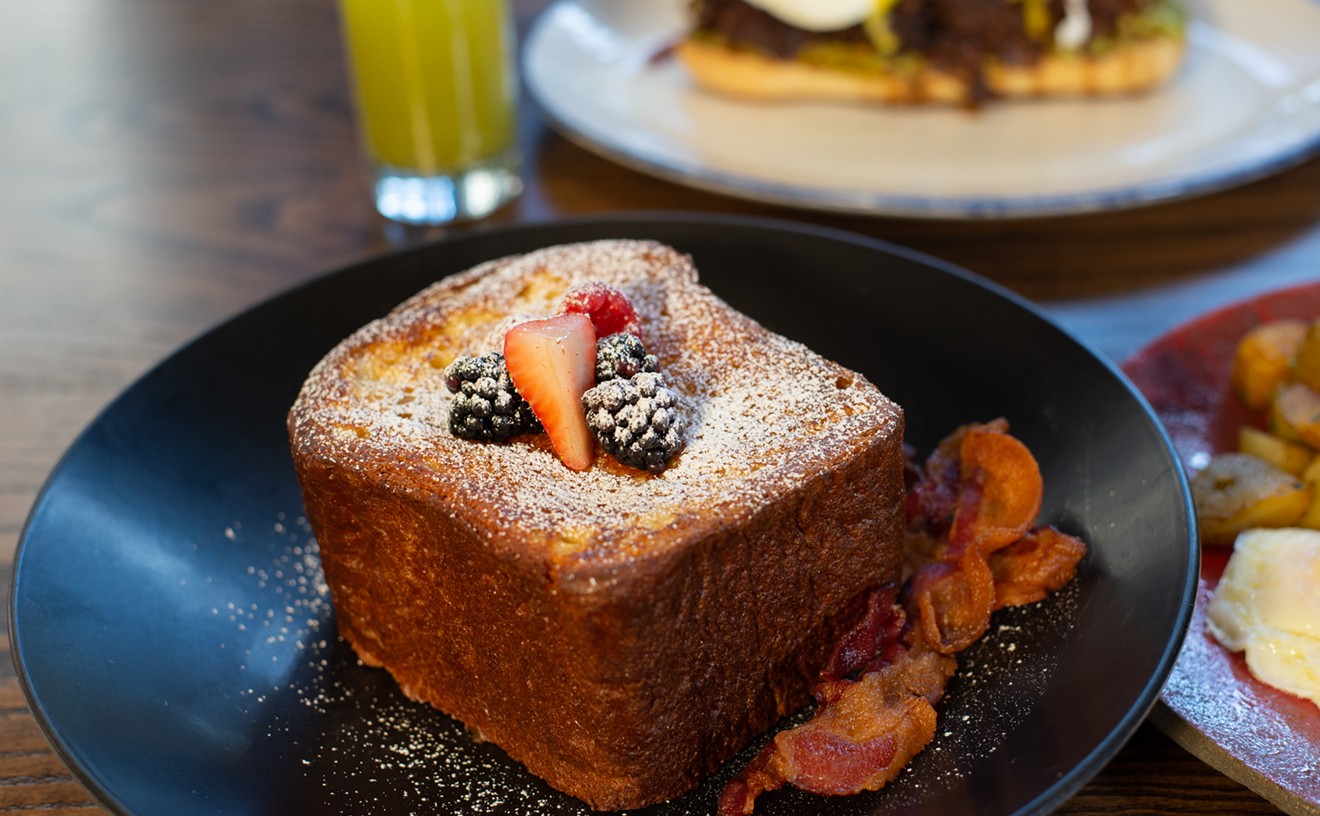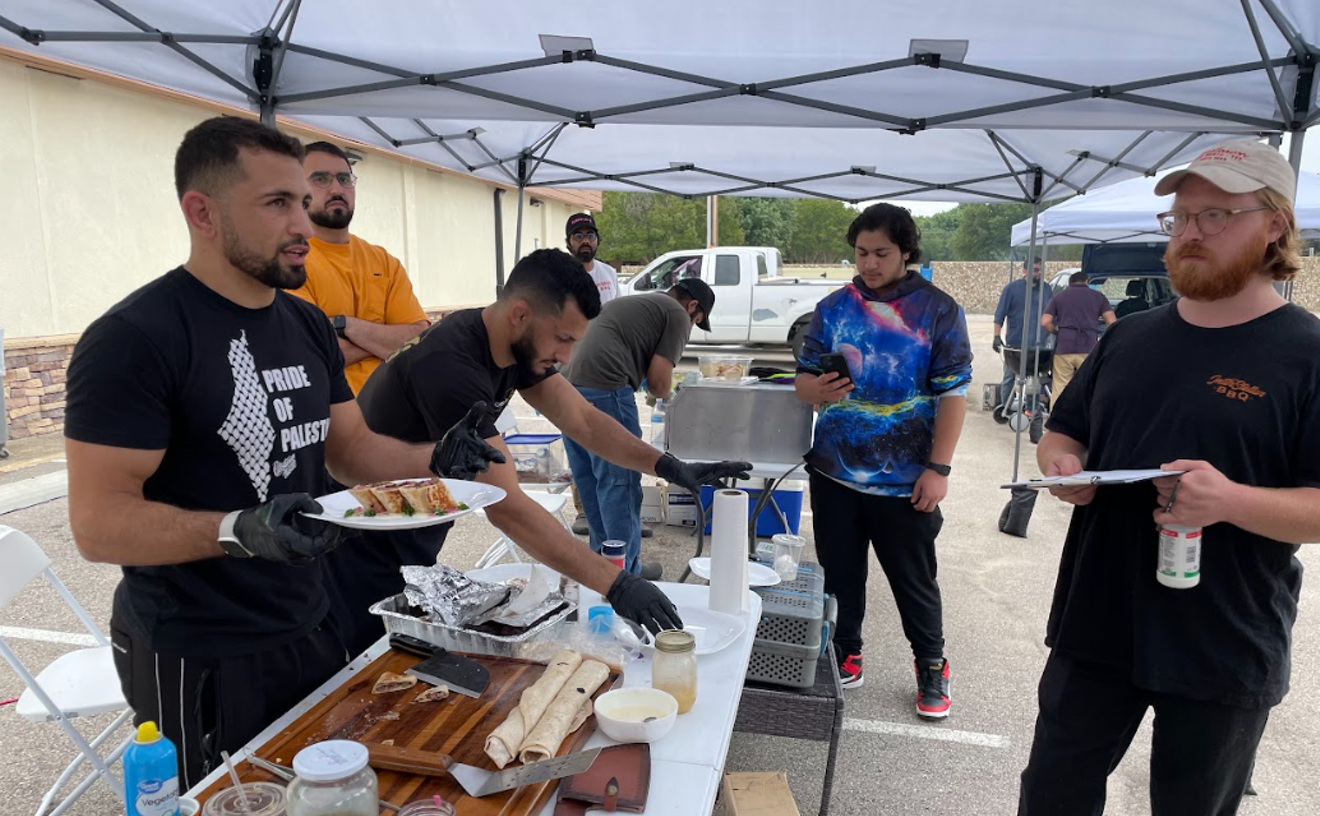In 2001, the Prison got new owners, downscaled its menu and was transmuted into the Prison Bars & Grill, where the distinguishing feature was karaoke on Thursday and Sunday evenings. It closed in 2003 perhaps because, as the McKinney Courier-Gazette reported, it did not have a history of good food and good service. Prisons seldom do. Now the landmark pen is for sale.
Poppy's Garden Café is also in a historic McKinney building, a creaky old house plugged into the core of McKinney's historic district. It used to be a restaurant called The Sweet Tomato. The Sweet Tomato closed for a peculiar reason: Business was thriving. "Business has never stopped; business has been good," manager Kim Garcia said in the McKinney Courier-Gazette. "Let me put it this way, we'll be going out like 'Seinfeld.'"
Out went the Tomato. This past August, the old house was taken by Jim and Carrie Garner, former Cici's Pizza franchisees. Poppy's is described as a general restaurant with "some Thai components;" a good descriptor now that New American has been worn down to a meaningless hash where nothing is American save for the chef.
These Thai components include Thai beef jerky with cilantro chili sauce, pad Thai and Thai braised short ribs. The wreath around the short ribs certainly isn't Thai-like: green onion polenta, green beans and roasted cipollini. The polenta is loose but delicious. The short ribs are shellacked in an unctuous brown glaze that's a blend of demi-glacé, soy, sherry, orange, honey and lemongrass. Yet after long moments in the maw, it's impossible to tease out any traces of the Thai constituency. Plus, the meat is laden with gobbets of fat and gristle, and there are no compelling flavors to compensate. Couldn't the kitchen have at least crowned the ribs in peanut sauce or braised them in ginger?
No, because the ginger is reserved for the crème brûlée. It comes in a boat. The crisp scorched sugar lid is warm. It is crowned with three raspberries and chunks of candied ginger. This must be the Thai component. Scatter the fragments, punch through the crust and plumb the custard. Notice it's cold instead of cool. It's stiff and porous, like a fine elementary school paste. It coats the mouth in fur. This brûlée was preformed and aged in the chiller.
Pad Thai was better. Tangled with about a half-dozen shrimp, the noodles are supple and separate and the sauce coats them smoothly and elegantly. Instead of peanut butter, the peanuts are crushed and sprinkled throughout. Sewn in with the noodles are strands of carrot, cuts of scallion, bits of egg and bean sprouts. A wedge of lime rests on the edge of the plate.
Here's a peculiarity: the "wine down." Included on the menu, the wine down is a menu of 20 wines, half by the glass for $5, the other half by the bottle for $20. The wine down is only available between 11 a.m. and 7 p.m. Menu verbiage insists that the wines-by-the-glass list cannot be had by the bottle and wines by the bottle cannot be had by the glass. What's the thinking here? "We wanted people to get educated," says general manager Junior Wakefield. Wakefield says that most of the people hit Poppy's with hopes of quenching a white Zinfandel thirst. He wants to steer them into something new cheaply and easily--hence the rules.
Still the inflexibility seems counterproductive, though Wakefield says if a glass bewitches you they'll let you pull a whole bottle. We probed the wine down on one visit: a glass of Mia's Pinot Noir. The wine had an off waft, as if it had been open for some time and had begun to tarnish.
We had other wine troubles, though this was mostly in the dispensing rituals. On a Saturday evening, in a vibrant but not heavily booked dining room, 20 minutes passed before a server noticed us. She scribbled an order for Sprite. She left before we could request a wine list (the "wine down" was down as it was beyond 7 p.m., the hour at which all wine education must stop and the great lager down ensues). Ten more minutes spooled off with no sign of a server; we went to the bar and ordered a bottle of Wild Horse Pinot Noir after the bartender showed the list.
It was never delivered. No one stopped by to inquire about a dinner order. Should we go to the kitchen to place our food order? While that Wild Horse was still a stray?
Five minutes later another server arrived, and he apologized as he plucked our wine glasses from the table. But we ordered a bottle of wine from the bar, we told him. "I'll get it," he said, replacing the glasses. He never returned. Another server arrived (our third if you're counting) and went to fetch our wine. She brought us two glasses sloshed with Wild Horse. But we ordered a bottle, we said. Go grab the bottle, she said to yet another server. It isn't McKinney's white Zinfandel drinkers that are in need of wine education. (In fairness, the Wild Horse was comped.)
A house salad of sprouts, greens, yellow pear tomatoes, red grape tomatoes and carrot washed in ginger-carrot dressing finally arrived. It was delicious; as was the warm goat cheese and frisée salad with golden beets wetted with sherry-bacon vinaigrette. A strip of orange-ginger-glazed salmon parked on a bed of jasmine rice had a delicately crisp crust and the flakes peeled off easily once that crust was breached and the flesh was stabbed. Spicy garlic broccolini, brilliant green and desperately crisp, kicked up the plate tension.
But the fried baby calamari was listless. Calamari has become the mindless pleasantry in menu discourse, the obligatory "how are you?" that never waits for a response.
It's the thought that counts, except when there isn't any. Fried calamari mostly occupies space instead of piquing interest. This calamari is scattered over the plate, bundled in a dull, dark reddish gold. It's not greasy, but the brittle coat has no zest. This is left to a puddle of honey-chipotle sauce that manages to be cloyingly sweet and annoyingly spicy at the same time. So we diverted the baby bodies to the ginger ponzu sauce that came with the tempura green beans. It helped.
The tempura on the beans is more effectively seasoned than the squid. Were it not for grease, these beans would easily be the superior appetizer. Served in a paper cone slipped into a wire martini service sculpture, the slightly shriveled beans molt easily, leaving tempura debris in the nose cone. The beans spritz a bit when bitten, retaining fluids from blanching, no doubt.
But maybe these flaws and slips don't amount to much when you consider the atmosphere. This charming, creaky old house flirts with rustic wood planks and splashes of red paint. White accents--mirrors, pottery, windows--give the place a little levity, which is offset by black napkins and tablecloths. The banquette seating is wrapped in poppy-patterned fabric that at one time would have made a swell wide tie. There is an expansive deck with fans and heaters and a clear roof to shield diners from rain and bird sorties. One evening the deck hummed with a guitarist and a crooner--much better than Prison karaoke. Still, this wine down isn't much better than a lockdown. Even when Thai'd up. 107 S. Church St., McKinney, 972-562-8386. Open 11 a.m.-2 p.m. Monday, 11 a.m.-9 p.m. Tuesday-Saturday and 11 a.m.-10 p.m. Friday and Saturday. $$-$$$










